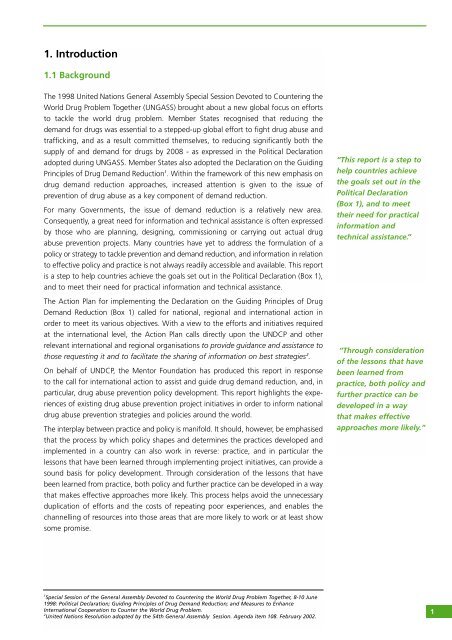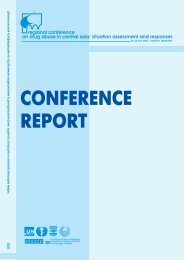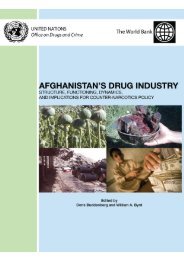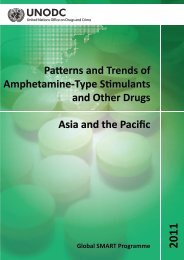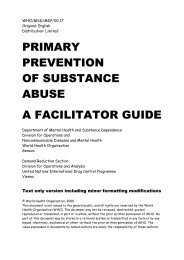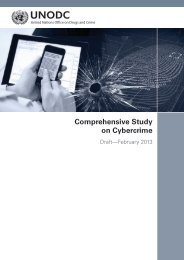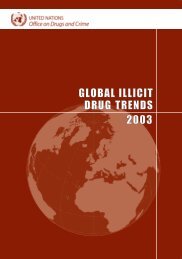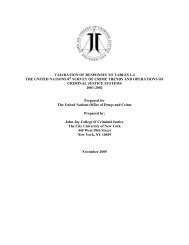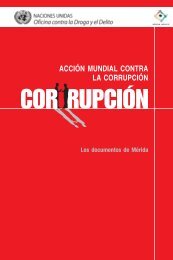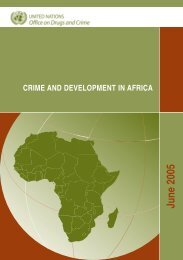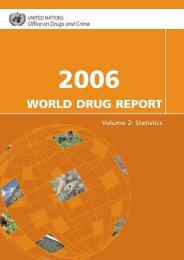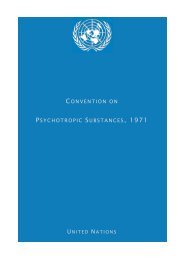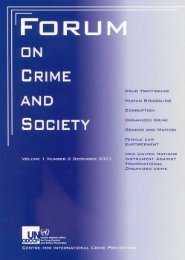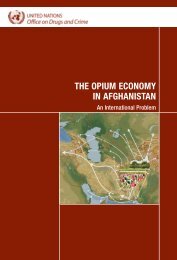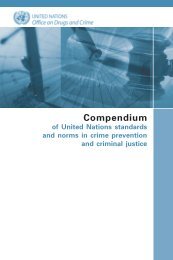PDF (Lessons learned in drug abuse prevention: a global review)
PDF (Lessons learned in drug abuse prevention: a global review)
PDF (Lessons learned in drug abuse prevention: a global review)
Create successful ePaper yourself
Turn your PDF publications into a flip-book with our unique Google optimized e-Paper software.
1. Introduction<br />
1.1 Background<br />
The 1998 United Nations General Assembly Special Session Devoted to Counter<strong>in</strong>g the<br />
World Drug Problem Together (UNGASS) brought about a new <strong>global</strong> focus on efforts<br />
to tackle the world <strong>drug</strong> problem. Member States recognised that reduc<strong>in</strong>g the<br />
demand for <strong>drug</strong>s was essential to a stepped-up <strong>global</strong> effort to fight <strong>drug</strong> <strong>abuse</strong> and<br />
traffick<strong>in</strong>g, and as a result committed themselves, to reduc<strong>in</strong>g significantly both the<br />
supply of and demand for <strong>drug</strong>s by 2008 - as expressed <strong>in</strong> the Political Declaration<br />
adopted dur<strong>in</strong>g UNGASS. Member States also adopted the Declaration on the Guid<strong>in</strong>g<br />
Pr<strong>in</strong>ciples of Drug Demand Reduction 1 . With<strong>in</strong> the framework of this new emphasis on<br />
<strong>drug</strong> demand reduction approaches, <strong>in</strong>creased attention is given to the issue of<br />
<strong>prevention</strong> of <strong>drug</strong> <strong>abuse</strong> as a key component of demand reduction.<br />
For many Governments, the issue of demand reduction is a relatively new area.<br />
Consequently, a great need for <strong>in</strong>formation and technical assistance is often expressed<br />
by those who are plann<strong>in</strong>g, design<strong>in</strong>g, commission<strong>in</strong>g or carry<strong>in</strong>g out actual <strong>drug</strong><br />
<strong>abuse</strong> <strong>prevention</strong> projects. Many countries have yet to address the formulation of a<br />
policy or strategy to tackle <strong>prevention</strong> and demand reduction, and <strong>in</strong>formation <strong>in</strong> relation<br />
to effective policy and practice is not always readily accessible and available. This report<br />
is a step to help countries achieve the goals set out <strong>in</strong> the Political Declaration (Box 1),<br />
and to meet their need for practical <strong>in</strong>formation and technical assistance.<br />
The Action Plan for implement<strong>in</strong>g the Declaration on the Guid<strong>in</strong>g Pr<strong>in</strong>ciples of Drug<br />
Demand Reduction (Box 1) called for national, regional and <strong>in</strong>ternational action <strong>in</strong><br />
order to meet its various objectives. With a view to the efforts and <strong>in</strong>itiatives required<br />
at the <strong>in</strong>ternational level, the Action Plan calls directly upon the UNDCP and other<br />
relevant <strong>in</strong>ternational and regional organisations to provide guidance and assistance to<br />
those request<strong>in</strong>g it and to facilitate the shar<strong>in</strong>g of <strong>in</strong>formation on best strategies 2 .<br />
On behalf of UNDCP, the Mentor Foundation has produced this report <strong>in</strong> response<br />
to the call for <strong>in</strong>ternational action to assist and guide <strong>drug</strong> demand reduction, and, <strong>in</strong><br />
particular, <strong>drug</strong> <strong>abuse</strong> <strong>prevention</strong> policy development. This report highlights the experiences<br />
of exist<strong>in</strong>g <strong>drug</strong> <strong>abuse</strong> <strong>prevention</strong> project <strong>in</strong>itiatives <strong>in</strong> order to <strong>in</strong>form national<br />
<strong>drug</strong> <strong>abuse</strong> <strong>prevention</strong> strategies and policies around the world.<br />
The <strong>in</strong>terplay between practice and policy is manifold. It should, however, be emphasised<br />
that the process by which policy shapes and determ<strong>in</strong>es the practices developed and<br />
implemented <strong>in</strong> a country can also work <strong>in</strong> reverse: practice, and <strong>in</strong> particular the<br />
lessons that have been <strong>learned</strong> through implement<strong>in</strong>g project <strong>in</strong>itiatives, can provide a<br />
sound basis for policy development. Through consideration of the lessons that have<br />
been <strong>learned</strong> from practice, both policy and further practice can be developed <strong>in</strong> a way<br />
that makes effective approaches more likely. This process helps avoid the unnecessary<br />
duplication of efforts and the costs of repeat<strong>in</strong>g poor experiences, and enables the<br />
channell<strong>in</strong>g of resources <strong>in</strong>to those areas that are more likely to work or at least show<br />
some promise.<br />
“This report is a step to<br />
help countries achieve<br />
the goals set out <strong>in</strong> the<br />
Political Declaration<br />
(Box 1), and to meet<br />
their need for practical<br />
<strong>in</strong>formation and<br />
technical assistance.”<br />
“Through consideration<br />
of the lessons that have<br />
been <strong>learned</strong> from<br />
practice, both policy and<br />
further practice can be<br />
developed <strong>in</strong> a way<br />
that makes effective<br />
approaches more likely.”<br />
1 Special Session of the General Assembly Devoted to Counter<strong>in</strong>g the World Drug Problem Together, 8-10 June<br />
1998: Political Declaration; Guid<strong>in</strong>g Pr<strong>in</strong>ciples of Drug Demand Reduction; and Measures to Enhance<br />
International Cooperation to Counter the World Drug Problem.<br />
2 United Nations Resolution adopted by the 54th General Assembly Session. Agenda item 108. February 2002.<br />
1


